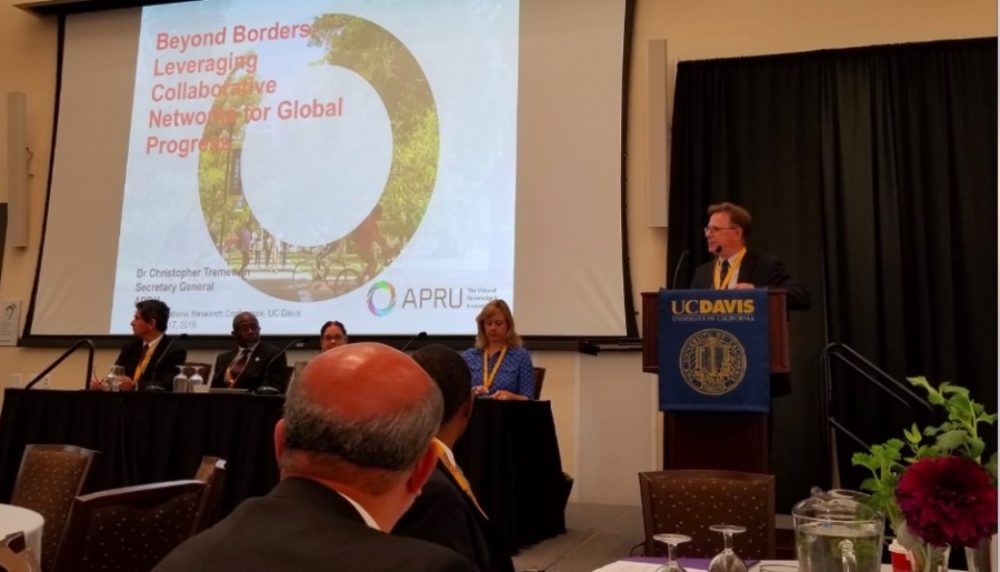Promoting global collaboration in times of the proliferation of protectionist rhetoric, APRU’s Secretary General, Dr. Christopher Tremewan, shared how APRU mobilized resources to create common good in a de-centralized manner at 2018 International Research Conference: Innovation within Changing Political and Research Environments held at UC Davis on September 17-18.
Participating in session, Beyond Borders: Leveraging Collaborative Networks for Global Progress, which highlighted the lessons learned in developing regional networks for innovative research, including common challenges and model practices, Dr. Tremewan commenced his speech by changing the topic wording from “global progress” to “the global common good” to address the urgency of overcoming inequality and rescuing the planet health.
A neutral network acting as a super-connector for the Asia-Pacific region, the strategic success of APRU comes from its flexible and de-centralized character and its access to enormous resources of good will and of knowledge.
“We are more emancipated from institutional power and national policy contexts,” said Dr. Tremewan. “The advantage of having no authority and very little money is that we are able to embrace new ideas and trends, establish new partnerships and processes and to explore.”
APRU’s current program initiatives are embedded in a wide diversity of contexts led by universities with research depth and policy outreach with deep knowledge of this diversity. They are drawn together by a cross-disciplinary, cross-border network platform.
“More and more universities are realizing the value they have created in the APRU network. The ability of a network to amplify their voice, to aggregate at scale at the international level the social power of knowledge and innovation for the benefit of our societies and the survival of the planet,” said Dr. Tremewan.
APRU counts Elsevier, Google, UN ESCAP, Asian Development Bank, The New York Times and many others as its partners. APRU’s success is also a result of its commitment to multilateralism in the face of economic nationalism, multi-stakeholder partnerships and the assertion of ethical leadership through identifying and standing for the global common good.
As the geopolitics of higher education and research has shifted towards the Asia-Pacific region, APRU is uniquely positioned to leverage its member universities’ academic capacities to deal with challenges emerging within national and international systems across the Pacific Ring of Fire.
“There is no time for passive modes of internationalization in higher education, the crises facing humanity now have an end date for organized human life,” said Dr. Tremewan. “We must work in new ways with the huge resources at our disposal.”
The two-day International Research Conference at UC Davis combined plenary sessions, small breakout sessions, “TED-style” talks, poster presentations by graduate students, discussions with funding agencies, industry, and community organizations, and opportunities for networking across disciplines and borders. This year’s focuses were on changing political environment and its impact on international research; Increasing importance of networks and consortia in advancing international research; Role of interdisciplinary or transdisciplinary research in solving global challenges and educating the next generation of international researchers.

